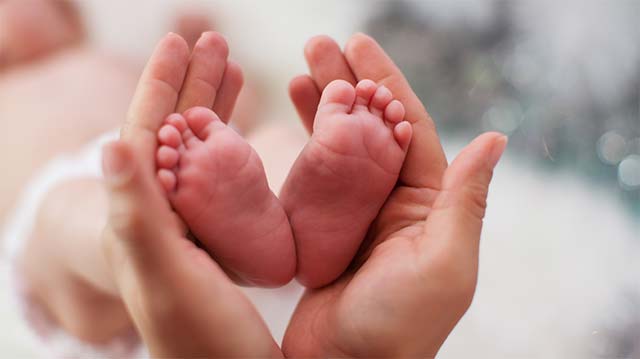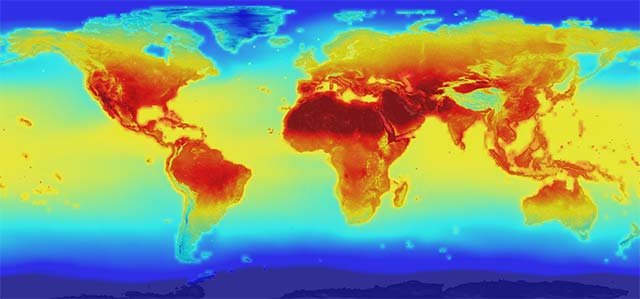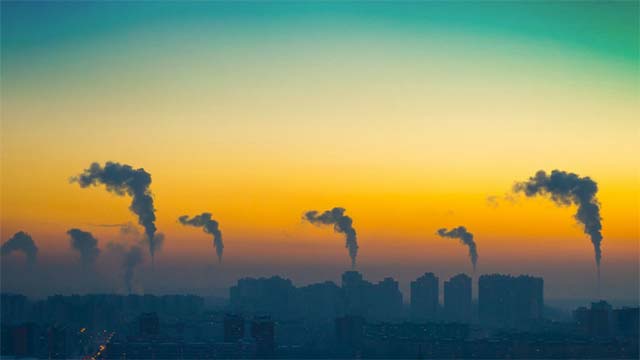The surprising relationship between climate change - birth rate and consequences
Climate change is an urgent global problem. In addition to the obvious natural impacts, climate change will also be one of the factors that play a leading role in influencing and shaping every aspect of human life - often in ways extremely complicated. Climate change leads to unpredictable natural disasters, affecting agriculture, living and even human life . these are issues that everyone can recognize, we temporarily leave these 'basic' insights and discuss some of the more surprising findings, such as how climate change affects the birth rates of many countries in the world, for example.

- 17 signs that the 6th great extinction - the nightmare of humanity is about to sweep through the earth
A recent study has shown that climate change may increase birth rates in tropical countries, thereby exacerbating the effects of climate change itself on countries. that, and at the same time widening the gap between rich and poor countries.
In this study, scientists have developed a model that combines the standard economic theory with the data obtained in relation to how climate change is likely to affect those Different sectors of the economy. For example, climate change is a phenomenon that has a wide range of impacts on a global scale, so it is not difficult to affect the entire agricultural sector. At the same time, agriculture will be more affected by climate change than other sectors of the economy, simply because weather conditions affect crop productivity as well as the viability of pet. The components of the economy such as industry and services . are of course less 'sensitive' to the weather at a similar level.

- How are people using plastic to destroy nature?
Scientists then analyzed the impact of climate change on a hypothetical economy, modeled after Colombia, one of the countries expected to be the hardest hit on climate change, and they found that if greenhouse gas carbon emissions continue to increase at a high level, climate change will seriously reduce agricultural productivity. This will increase the price of agricultural products and negatively affect wages, while attracting a large share of the labor market to the agricultural sector. We all know that the agricultural sector requires less formal education than other sectors of the economy. Therefore, parents will tend to invest less resources in the education of each child, and instead choose to have more children. This so-called "quantitative trade-off" is an unfamiliar phenomenon, which has played a prominent role in the transition from an agricultural economy to industry in so many countries. World before.
As a result, for a country like Colombia, higher birth rates will parallel lower education levels. Moreover, higher birth rates often lead to an increase in economic struggle among countries, so low fertility may be an important part of a vicious cycle: It is motivated by change. climate but at the same time also exacerbates the effects of this phenomenon. 'Our model shows that damage from climate change to low latitude countries can be significantly larger than previously estimated,' the team said.

- Research shows that smartphones are the most destructive environmental factors
However, in a positive note, cutting emissions to curb climate change may help alleviate this problem. If actual emissions reduction measures are effectively implemented, negative demographic effects outlined under the above research model will basically be eliminated.
However, climate change will also not affect the agricultural systems of all countries in the world in the same way, but will have differentiation by country, region, and territory. earth. For this reason, the researchers have further analyzed the assumptions that would occur with an economy like Colombia located at latitude 25. There, changes in temperature would be larger, but the level impacts on agricultural productivity are smaller, leading to more limited effects on fertility and population structure.
However, for a country with a Colombia-like model that is located at a latitude of 45 - close to the Swiss position - climate change on the other hand contributes to increasing agricultural productivity, leading to a decrease in the fertility rate.

- Half of the wild animals of large forests may disappear as the planet heats up
In the final model, researchers have analyzed the impact of climate change on an economy like Switzerland, characterized by greater wealth, lower birth rates and qualifications. Higher education than Colombia. The end result is also amazing: Climate change will increase fertility and reduce the quality of education for countries located in the tropics. On the other hand, this phenomenon contributes to reducing birth rate and increasing the quality of education for countries located in high latitudes.
'The analytical results for Switzerland and Colombia are almost the same for every other country at the same latitude, suggesting that the geographical position, instead of the level of development, is the main cause of disagreement. most in the relationship between fertility rates and climate change in our research models, 'said one scientist.
In addition, there are many other mechanisms by which climate change can affect fertility rates and population structure - including factors related to economy, cultural change, and Other events like natural disasters or war. In addition, the trade-off between quality and quantity has also been used as an example to promote surveys in this area of research.

- A global temperature increase of only half a degree may cause 5 million people to lose their homes
However, this study also shows that changes in fertility rates can increase inequality in society as well as between countries in the world - which is also a contributing factor to change. climate. The effects on fertility may increase the income gap between high latitudes (richer countries) and countries around the equator (poorer). But that also means that the effects of climate change on birth rates also reinforce the benefits of emissions cuts on a global scale.
You should read it
- ★ Look for evidence of climate change in Antarctica with an iPhone
- ★ Global warming is killing intestinal bacteria in lizards
- ★ Climate change is causing the sea to flow faster, scientists are still confused about what the harm will be
- ★ Successful production of Eco-Eco rice reduces climate change
- ★ Climate change puts bees at risk of extinction, but it's not too late for humanity to save them and save themselves